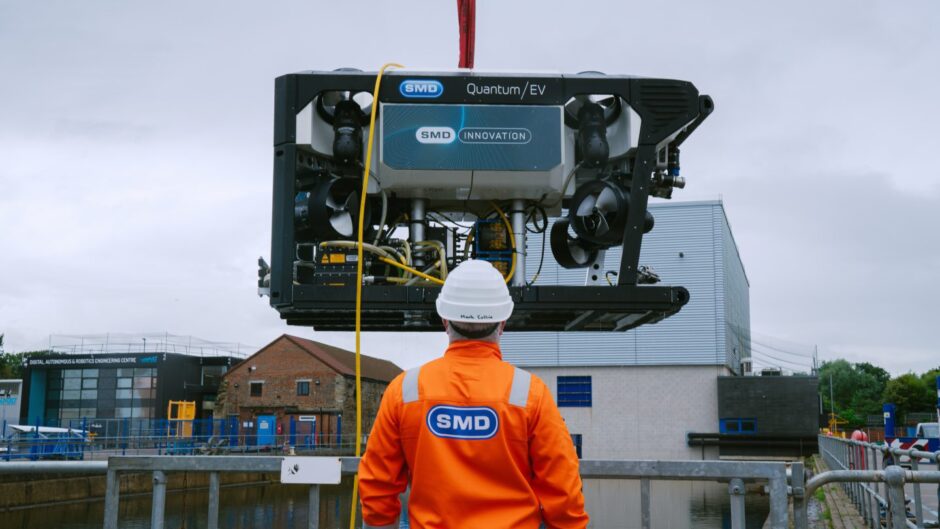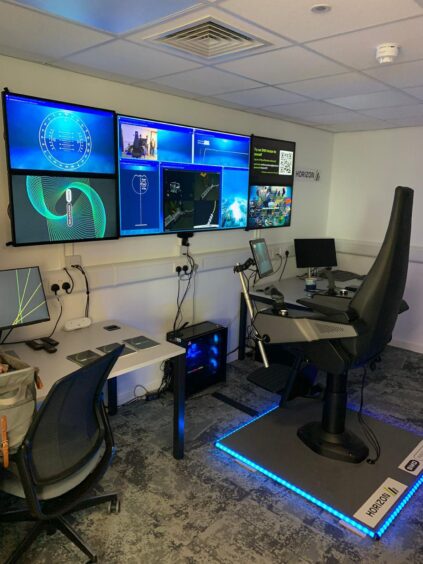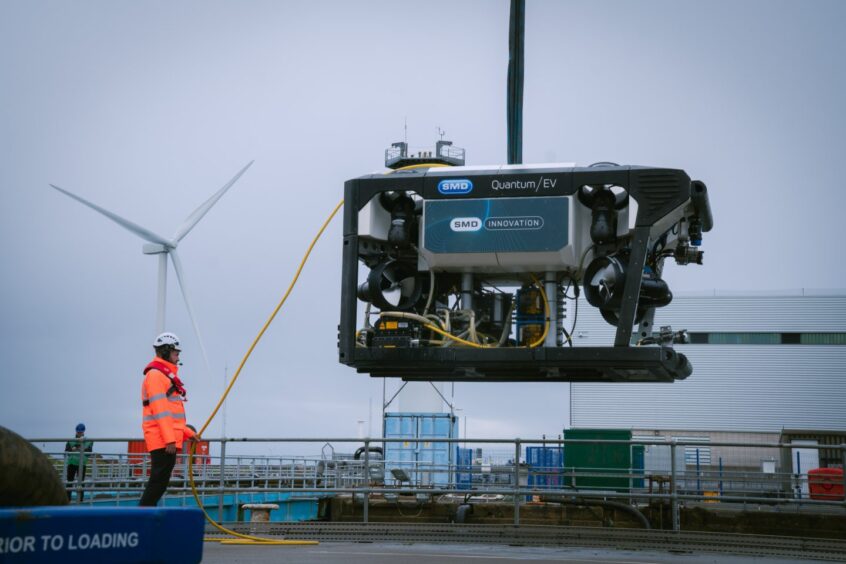
As engineering firm SMD was looking to test its new remotely operated vehicle, it struggled to find a UK-based partner to supply an adequate power system, the firm’s head of innovation said.
As the firm was set to trail its electric remotely operated vehicle (eROV) in October last year, the device was only able to half test the eROV as it had not found a UK company that could supply the DC power train component it needed.
This eventually led the engineering business to call on its Chinese parent company to meet the demand the UK market couldn’t.
Mark Collins, head of innovation at SMD, told Energy Voice: “We went up in August and we had tested our eROV at lower power up in Blythe during August and then the plan was to get back to Blythe towards the back end of the year at much higher power to test eROV and also to test our Horizon capability.”
SMD’s “Horizon System” will enable its clients to pilot ROVs from “anywhere in the world”, changing how the industry approaches the technology, the firm’s engineer for innovation, Andrew Ambrose-Thurman, said at Offshore Europe last year.
The cloud-connected Horizon System allows people onshore to pilot an ROV that is out at sea, enabling clients to collect data without having to keep a team on a vessel on the water from one of SMD’s “modular” pilot chairs and control systems.
However, the testing of Horizon in conjunction with eROV hit a snag.
Mr Collins explained: “We have managed to test half of it, so it is coming together, but we haven’t gone through the full testing yet of the horizon and that was more to do with the fact just some of the delays on the eROV programme.”
The eROV is back in the tank at the firm’s base in Newcastle and SMD is gearing up to fully test the technology at the beginning of this month.
When questioned on the “delays facing the company’s eROV project, the head of innovation explained that despite coming out of the pandemic was “disruptive” and caused supply chain constraints, the main problem SMD faced was “finding a suitable partner.”
He said that in the UK it’s been “a real problem” trying to find a firm that could “develop this very, very high-tech technology.”
Mr Collins explained: “What we’ve been doing is we’re absolutely pioneering our new DC power system, this is a DC transmission and power system.
“The reason we’re wanting to use that now on subsea robots is it’s extremely efficient.”
He added: “We call it a DC ecosystem, which will allow cabled and un-cabled operations. But it’s very, very difficult to do because we’re transmitting at high voltage DC we’re transforming that high voltage DC down to low voltage DC for a bus on the vehicle, which is quite similar to how an electric car works.”
This “high-tech” system proved a bridge too far for the UK firms SMD contacted and it forced the firm to look further afield to source its eROV power system.
Mr Collins said that SMD looked for a UK company to work with “for nearly three years and we didn’t get anywhere.” the head of innovation also added that his firm “works with lots of partners in the UK.”
With a lack of UK options, SMD “ended up having to go overseas” and it worked with its parent company CRRC.
CRRC is a Chinese state-owned multination rolling stock manufacturer.
SMD’s head of innovation added the caveat: “The technology SMD is developing is primarily developed in the UK with UK expertise but sometimes we do have to go overseas and go to the best place for said technology.”
The UK is shying away from the ‘difficult subjects’
Why are UK firms struggling to meet the demands of the eROV project? To Mark Collins, the answer lies with where UK students are focussing their efforts.
He says: “If you look at some of the difficult subjects to study in the UK, such as electrical engineering or electronic engineering, the amount of UK nationals going into these courses has been reducing steadily because they’re hard.”
Mr Collins pointed to countries like India and China, saying that they “revere people who study these subjects” and that students are encouraged to pursue careers in those fields.
Sharing his personal opinion on the matter, he added: “In the UK we have a bit of an issue with inspiring kids and getting them into these difficult areas.”
Following these comments, an SMD spokesperson explained that there is a “huge demand” for the skills outlined by Mr Collins in the UK.
The firm said that the market for people with the skills that are in short supply is “competitive” and that with no pipeline of talent, workers in these fields are “few and far between.”
Mr Colins added: “it’s not just the underwater industry, every industry that is electrifying.”
Pointing to big-name electrical engineering firms like Dyson and Tesla he continued: “That’s where all the big wages are. They’re paying big money.
“So, if people are wanting careers, it’s a pretty solid career move but what I think is lacking is the education system doesn’t quite understand that. We haven’t sold the idea of what engineering is and inspire them in that way.”
‘You can’t just sit there moaning about it’
To ensure that SMD has access to the UK graduates in relevant engineering fields the firm runs what Mr Collins calls the “shop floor programme.”
He said: “We’re putting a lot of effort into STEM and supporting STEM subjects at school lever and our HR department is extremely busy supporting a lot of STEM events.
“We’ve got quite a large graduate programme. We’ve got quite a large what I call the shop floor programme, the vocational skill sets bringing people from the colleges as well.”
While happy to run these programmes, the SMD head of innovation says that Brexit pushed the firm to step up student initiatives.
“You can’t just sit there moaning about it. You’ve got to do something about it and it’s our duty to take some responsibility,” Mr Collins expressed.
He adds that the “cool stuff” that his firm, and others like it, make could be a good way to inspire the next generation of workers to pursue careers in engineering.
“We’ll make robots and things, if you’re going to try and inspire our kids let’s show them the robots and make them as cool as possible.”
He says that there is “gaining momentum” in the space as more young people look to engineering as a career path.
“We’ve been starting to see some of the results. We’ve now got quite a few graduates, I think we’ve got about 5 or 6 graduates in and similar on the on the technicians side and they’re all getting involved.”
SMD said that it believes in “long-termism”, explaining that it has an engineer who participated in its first graduate programme in 2011 and still works for the firm.
The head of innovation interjected: “We do live in a very reactive world at the moment – easy come, easy go – and that very quick thinking doesn’t work.
“You’ve got to take a long-term view of things because it takes time to build a head of steam.”
Creating jobs and growing the business throughout 2024
Throughout 2023 SMD created 40 jobs, the firm’s HR team recently confirmed. The company is looking to continue creating jobs as it forecasts growth throughout the year.
“We’re seeing growth across all of our main markets, in the offshore sectors.
“The main growth within those for SMD is around our service offering which is growing over 50%, certainly in the last 12 months and it’s due to continue on that trajectory for the foreseeable future,” Mr Collins said.
The firm is seeing this growth in its work supporting older assets by helping “eke out as much useful life from assets as we possibly can.”
The head of innovation added that SMD has been kept busy with its new technologies, a division that is primarily focused on working with the renewable energy sector.
Trenching is also seeing success for SMD with its work in telecoms and offshore power markets, Mark Collins explained.
This growth is set to continue in 2024 as the Newcastle-based business strives to hire a further 50 people over the next 12 months.
Recommended for you


 © Supplied by SMD
© Supplied by SMD © Supplied by SMD
© Supplied by SMD © Supplied by SMD
© Supplied by SMD © Supplied by SMD
© Supplied by SMD